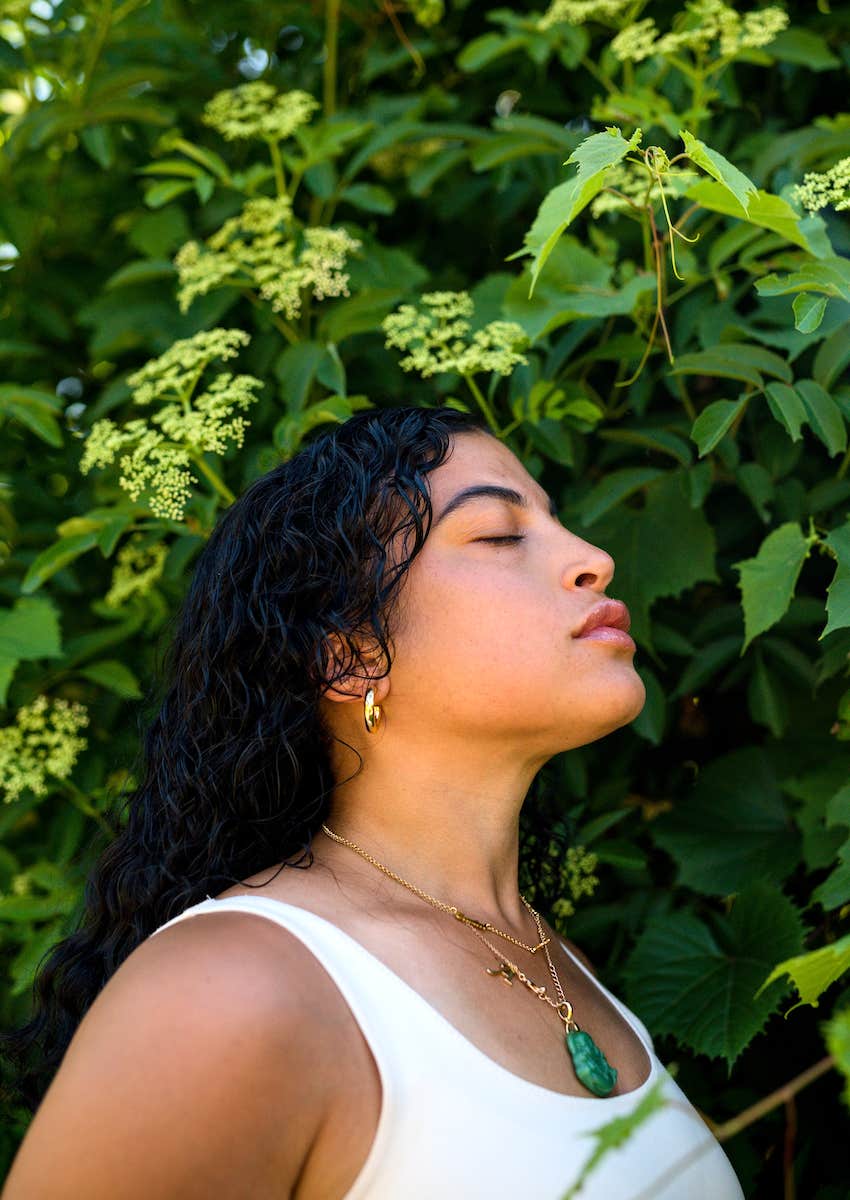The 2 Opposite Emotions Successful People Balance Every Single Day
It's not easy to hold two opposing feelings, but it's necessary in order to get to the next level.
 fcscafeine | Canva
fcscafeine | Canva Fear and courage may seem like opposites, but if you recognize the connection between them, you'll be on your way to a successful and liberating future. People self-sabotage or get stuck in a rut for one major reason: fear.
Despite fear and courage being opposites, you can be one of the most fearful people on earth and still be one of the bravest. Here's the secret: You can't get through life without experiencing some kind of fear, and facing your fear is the only way to get through it.
Courage does not mean an absence of fear. Getting through fear is an act of bravery. But first, you've got to know you're afraid, and the best clues to fear are physical.
Here's how to be brave & afraid at the same time.
1. Find, observe, and feel fear in your body.
Your mind and body are connected, your conscious and unconscious are connected, and you have to care for both. To care for them, you need to notice them.
"You can't be worried without having a physical corresponding reaction. Every thought, feeling, or emotion you have is reflected in your body. Everything in your body is connected to your brain. So when you have an emotional experience, it's happening on the physical level, too," says Whole Body Revolution founder Sukie Baxter.
Notice where your body is most tight and contracted — you'll find where your worry resides. When your body is tense, it's sending messages to your brain that you're not safe. Then, your brain sends back messages to your body that it's not safe. It's a vicious cycle! Not to mention the possibility of burnout. These physical symptoms show you're experiencing fear.
To remove the fear in overdrive from your body, try this simple exercise to regulate your nervous system. Feel your feet on the floor fully, or better yet, on the ground outside while barefoot. Take three deep full breaths to your abs and back up. Then, let your gaze rest softly on your surroundings, and name a few things around you, especially the things you love. Notice. Focus. Then, shift your head from side to side, up and down. Open and close your eyes a couple of times. Feel yourself in your body.
Note the difference in the tension in your body. Are your shoulders still tight? Is your back as stiff?
2. Connect with fear in your mind.
Now you've located your fear, you've calmed yourself down. Your body is probably feeling better. Next, figure out why you're afraid.
Get up and out of your everyday surroundings and away from your screens! Connecting with your mind isn't about filling it with other people's ideas, thoughts, or opinions. It's about connecting with your own.
Sit in stillness, quiet for five minutes or so, feeling your inhales and exhales, letting your eyes go soft and unfocused on your surroundings. Then, allow your thoughts to enter this inner sanctum. It's OK if they're already there. Just notice them and make a list of them.

Photo: Alfield Reeves vis Shutterstock
Do you see any similarities, patterns, or habitual thoughts? If you're aware of these thoughts, that's the first step toward not letting them take over and scare you. Then, close your eyes and sense into the peskiest thought, the one triggering you the most, in this very moment. If the thought were a thing, what would it be? If it were a person, what would it say? What if it were a sound? What would you hear? If it were a place, what would its name be?
Stay in this visualization for as long as you feel safe, peaceful, and relaxed. Then, write down your observations in a journal. Notice if you feel any more relaxed than before you began this exercise.
As author Ann Lamott said, "I am one of the most fearful people on earth and one of the bravest. (All truth is a paradox.)"
3. Research and observe.
When you experience fear, look at your notes. Find any symbols or consistent signals to point you toward the reasons for your fear. For example, you may think you have stage fright, but your fear may stem from being teased as a child.
Your fear of asking for a raise may stem from your family almost going bankrupt. Or it may connect with something even less obvious, like grief for a beloved friend or pet. If you sit with the reasons, digging deep, you'll notice how your mind eases and your body lets go of more tightness.
Once you've identified your fear and figured out why you feel afraid, you probably want to "fix" it. But the only way is through it. That's what fear and courage have in common. You have to practice being afraid to practice bravery.
You can use exercises to feel better, but fear is part of being human. And so is courage.
4. Engage with your fear every day.
Next time you feel triggered, nervous about doing something out of your comfort zone, uncomfortable about saying something, or squirmy at being who you are, observe your fear in your body and your mind. And keep a record to notice any patterns habits or triggers. Once you're feeling more comfortable within your mind and body, it's time to do something that scares you.
Do the thing you're most fearful of. "You gain strength, courage, and confidence by every experience in which you stop to look fear in the face," Eleanor Roosevelt said.
Pick up the telephone and call an estranged relative or friend. Ask for a raise or promotion. Start a podcast or TV show. Sing a song at karaoke night. And, most of all, speak your truth with kindness and understanding for the listener and yourself.

Photo: Pablo Calvog vis Shutterstock
5. Practice makes progress.
Experiment. Figure out which exercises work best for you to step out of fear and into calm bravery.
Every time you feel tense, remember to name how you're feeling and figure out where it's coming from. Notice patterns, and then do the thing you fear. You'll gradually gain confidence and the fear may dissipate or disappear as you do. Then, it's time to face the next intimidating challenge. Start with something small and increase the difficulty of the task that scares you as you strengthen your bravery muscle.
Be brave. Do brave. Live brave.
Befriend your fear, be kind to yourself, even love yourself through it, and you'll become one of the bravest people on earth.
Kathryn Brown Ramsperger wrote for National Geographic and Kiplinger before working as a humanitarian journalist in Africa, Europe, and the Middle East. She's also an intuitive creativity coach and creator of Step Into Your Story! (TM), as well as the award-winning author of two novels, including her latest, A Thousand Flying Things.

